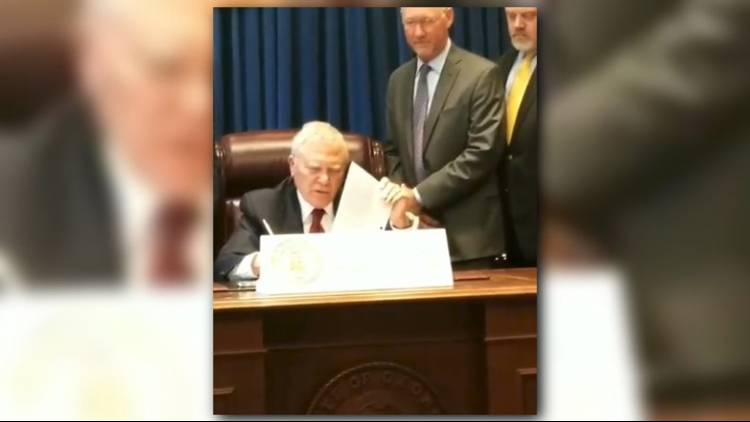ATLANTA -- Gov. Nathan Deal signed a bill on Monday expanding the legal use of medical marijuana in Georgia to include those suffering from Post-Traumatic Stress Disorder (PTSD) and intractable pain.
The new law specifically defines "intractable pain" as being "pain that has a cause that cannot be removed and for which, according to generally accepted medical practice, the full range of pain management has been used for at least six months without adequate results or with intolerable side effects."
The type of PTSD covered under the scope of the new law is also specifically defined. The law says the type of PTSD covered is "resulting from direct exposure to or the witnessing of a trauma for a patient who is at least 18 years of age or [in] intractable pain."
Georgia's first medical marijuana bill was passed by the General Assembly in 2015 and covers more than 15 other medical conditions. Anyone who falls in those categories may apply for a low THC oil registry card, which permits qualified people to have up to 20 fluid ounces of low THC oil, which is derived from the cannabis plant.
Georgia's law is far more limited than other states like Colorado and California, in that it does not legalize the sale or possession of marijuana in leaf form. Retail establishments in the state of Georgia are not permitted to sell marijuana or items produced from the cannabis plant. Physicians in Georgia are not permitted to prescribe marijuana for medical purposes as they are in some other states.
To apply for the registry card, an application is sent by the physician treating the patient. There are two forms tied to the application, including a waiver form signed by the applicant and the physician, then a physician certification form which is submitted to the state.
► PREVIOUS COVERAGE
Once approved, patients are contacted by the Georgia Department of Public Health (DPH) to determine which of the state DPH offices is most convenient for picking up the card. The fee for a new card is $25, and is valid for 2 years following the date of issue.
The state does not regulate or provide information where individuals can purchase low THC oil. The law only creates a means so that qualified people are not prosecuted if they have it in their possession.
Full-scale sales of marijuana remain illegal in Georgia.
► Download the FREE 11Alive News app now in the iTunes store or on Google Play.



